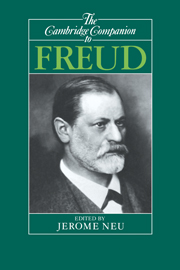Book contents
- Frontmatter
- Introduction
- 1 Freud: The psychoarcheology of civilizations
- 2 Seduced and abandoned: The rise and fall of Freud's seduction theory
- 3 Freud's androids
- 4 The interpretation of dreams
- 5 The unconscious
- 6 The development and vicissitudes of Freud's ideas on the Oedipus complex
- 7 Freud and perversion
- 8 Morality and the internalized other
- 9 Freud on women
- 10 Freud and the understanding of art
- 11 Freud's anthropology A reading of the “cultural books”
- 12 Freud's later theory of civilization
- 13 In fairness to Freud: A critical notice of The Foundations of Psychoanalysis, by Adolf Grünbaum
- Bibliography
- Cited works of Freud
- Index
- Series list
11 - Freud's anthropology A reading of the “cultural books”
Published online by Cambridge University Press: 28 May 2006
- Frontmatter
- Introduction
- 1 Freud: The psychoarcheology of civilizations
- 2 Seduced and abandoned: The rise and fall of Freud's seduction theory
- 3 Freud's androids
- 4 The interpretation of dreams
- 5 The unconscious
- 6 The development and vicissitudes of Freud's ideas on the Oedipus complex
- 7 Freud and perversion
- 8 Morality and the internalized other
- 9 Freud on women
- 10 Freud and the understanding of art
- 11 Freud's anthropology A reading of the “cultural books”
- 12 Freud's later theory of civilization
- 13 In fairness to Freud: A critical notice of The Foundations of Psychoanalysis, by Adolf Grünbaum
- Bibliography
- Cited works of Freud
- Index
- Series list
Summary
How can the insights into individual psychology gained through the techniques of psychoanalysis illuminate the cultural, collective life of people in society? Freud returned to this question throughout his career in a series of works sometimes referred to as the “cultural books” ; these include Totem and Taboo (1912-13); Group Psychology and the Analysis of the Ego (1921c); Civilization and Its Discontents (1930a); and Moses and Monotheism (1939a). In this essay, I give an exposition of these works in which I stress their unity, their evolution as psychoanalytic theory itself developed, and what I take to be their central argument. I also intend to show how vital aspects to this central argument may, despite the many difficulties these books present to the contemporary student of society and culture, contribute in powerful ways to our understanding of human social existence.
Before turning to the cultural books themselves, however, I want to begin by drawing attention to the fact that Freud was, from the first, concerned with ordinary cultural life. Of the book-length projects to which he applied himself as soon as he had completed the self-analysis which played so crucial a role in his intellectual development, three were nonclinical accounts of normal phenomena in which are visible the workings of unconscious thought processes, namely, dreams (1900a), slips of the tongue (1901b), and jokes (1905c). The effect of these works is to undermine the very distinction between normal and neurotic and to show that something other than rational, secondary process thought is a normal and essential aspect of all human life.
- Type
- Chapter
- Information
- The Cambridge Companion to Freud , pp. 267 - 286Publisher: Cambridge University PressPrint publication year: 1991
- 11
- Cited by

